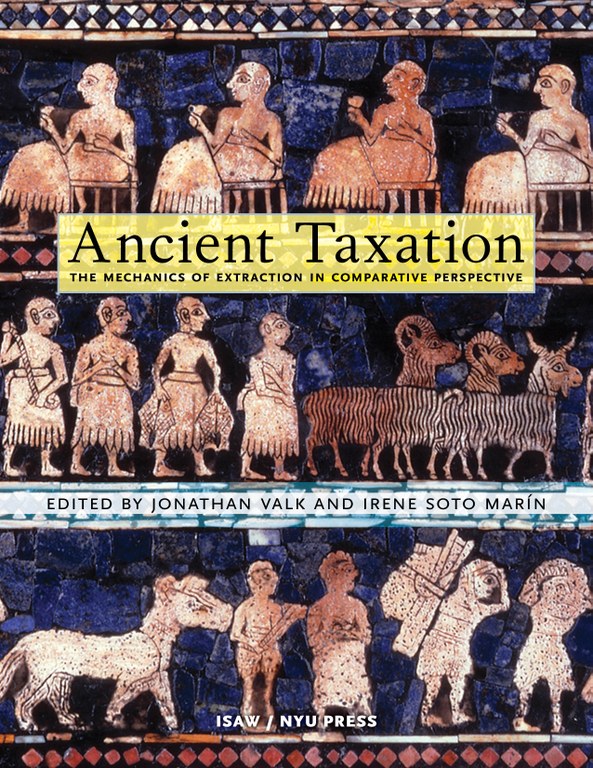Ancient Taxation: The Mechanics of Extraction in Comparative Perspective

- edited by: Jonathan Valk, Irene Soto Marín
- August 2021
- ISAW/NYU Press
- ISBN: 9781479806195 (hardcover); 9781479806218 (ebook)
Ancient Taxation is a collection of studies that explores the extractive systems of eleven ancient states and societies from across the ancient world, ranging from Bronze Age China to Anglo-Saxon Britain. The contributors discuss the inherent challenges of taxation in predominantly agro-pastoral societies, including basic tax strategy (e.g., taxing goods vs. labor, in-kind vs. money taxes, etc.); the mechanics of assessment and collection; and the politics of negotiating the cooperation of social, economic, and political élites and other important social groups.
In assembling a broad range of studies, this book sheds new light on the commonalities and differences between ancient taxation systems, and so on the broader fiscal and institutional practices of antiquity. It also provides new impetus for further comparative research into extractive practices across ancient societies and between antiquity and recent historical periods.
The book will be of interest to those studying ancient social and economic history, the history of social organization, and the history of ancient Greece and Rome, Egypt, the Ancient Near East, or ancient China.
Table of Contents
List of Figures
Preface
1. A State of extraction: Navigating taxation in ancient polities (Jonathan Valk)
2. Taxing questions: Financing the Chinese Bronze Age (Roderick Campbell)
3. Co-option and patronage: The mechanics of extraction in southern Mesopotamia under the Third Dynasty of Ur (Steven Garfinkle)
4. The extractive systems of the Mycenaean world (Dimitri Nakassis)
5. Extracting cohesion: Fiscal strategies in the Hittite staple economy (Lorenzo d’Alfonso and Alvise Matessi)
6. Taxation in Anglo-Saxon England, fifth–ninth centuries CE (Pam J. Crabtree)
7. Taxation, aristocratic autonomy, and theories of reciprocity in the Iranian Empire (Richard Payne)
8. Fiscal transitions in early China from the Warring States to the Empires (late fourth to first century BCE) (Maxim Korolkov)
9. The fiscality of foreign relations in the Roman Republic (241–146 BCE) (James Tan)
10. Changes and limits of royal taxation in pharaonic Egypt (2300–2000 BCE) (Juan Carlos Moreno García)
11. Greek perspectives on fiscal administration under Alexander the Great (Andrew Monson)
12. The anabolikon tax and the study of the linen industry in Roman Egypt (Irene Soto Marín)
About the Contributors
Index
Praise for Ancient Taxation
This is an impressive and very useful collection. It introduces non-specialists to a wide range of examples of pre-modern taxation practices. There are very few other volumes that have tried to do something similar, and most of what is included here is new in the sense that it cannot be found in any of these other surveys. This collection therefore performs a major service for historians of pre-modern state formation and socio-economic development. ~Walter Scheidel, Dickason Professor in the Humanities, Stanford University
About the editors
Jonathan Valk is a graduate of ISAW and University Lecturer in Assyriology at the University of Leiden. His research covers the interface between state and society in the Ancient Near East.
Irene Soto Marín is a graduate of ISAW and Assistant Professor of Classical Studies and Assistant Curator in the Kelsey Museum at the University of Michigan and the author of several articles and chapters on the ceramics, numismatics, and economic history of Roman and Late Antique Egypt.